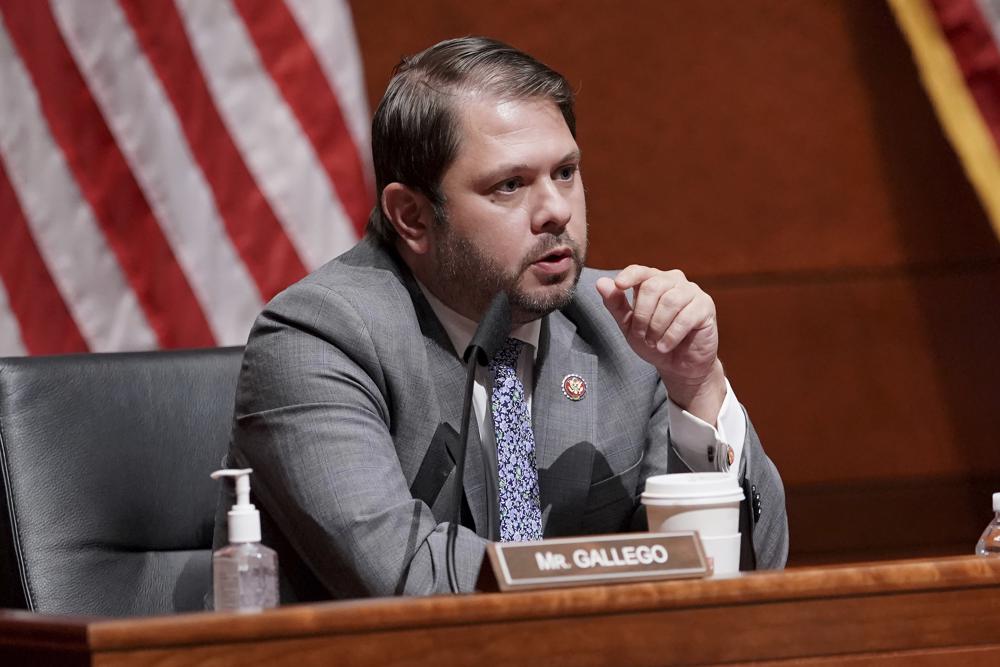Investment standards debate moves into state legislatures

Environmental, social, and governance investment standards are a hot topic among Republican lawmakers across the U.S., who see it as a political move to force a progressive agenda. Democrats, on the other hand, see it as a smart investing strategy. Oklahoma is the latest state to attract national attention to ESG investing, even though the Legislature passed a bill regarding it last year. State Treasurer Todd Russ published a list of 13 financial institutions banned from doing business with the state of Oklahoma earlier this month because of their ESG policies regarding fossil fuels. Those 13 companies have 90 days to tell the state it has stopped boycotting energy companies. And if they haven’t stopped their boycott, the law grants the state six months to divest itself of 50% of investments with the financial company and a full year to divest 100%. In Tennessee, Gov. Bill Lee signed a bill that prevents the state’s treasurer from investing state funds based on ESG. The bill’s fiscal note states it will not significantly impact state or local revenues. Some Republican states are raising concerns and sometimes rejecting bills banning ESG-related policies. The North Dakota House of Representatives rejected a bill that would have required the North Dakota Department of Financial Institutions to monitor banks for ESG policies. The bill would have cost the state about $1.7 million, with most of that going to salaries for additional bank examiners. The Arkansas Legislature also discussed possible fiscal implications when discussing a bill similar to Oklahoma’s, requiring the state to divest from financial institutions with ESG standards. The treasurer would also have to maintain a list of those financial institutions. Gov. Sarah Huckabee Sanders signed the legislation. Fiscal concerns have not deterred every state from opposing ESG standards. Indiana Gov. Eric Holcomb signed House Bill 1008, which prohibits the board of trustees of the Indiana public retirement system “from making an investment decision with the purpose of influencing any social or environmental policy or attempting to influence the governance of any corporation for nonfinancial purposes.” It also requires the pension board to make investment decisions “solely in the financial interest of the participants and beneficiaries of the system for the exclusive purposes of providing financial benefits to participants and beneficiaries and defraying reasonable expenses of administering the system.” This despite concerns the state could lose $6.7 billion in investments. Utah Attorney General Sean Reyes, Alabama Attorney General Steve Marshall, and Illinois State Treasurer Michael Frerichs testified before the U.S. House Oversight Committee earlier this month. Frerichs told the panel that ESG was simply data used to make investment decisions. Treasurers and comptrollers from Colorado, Connecticut, Delaware, Massachusetts, New York City, Oregon, Vermont, and Washington state issued a statement backing Frerichs’ testimony. “The truth is simple. More data on risk leads to stronger returns for retirement accounts over the long term,” they said. “Ignoring risks to focus on short-term gains is not aligned with the needs of millions of Americans saving for retirement or their families’ education. But it is aligned with a short-term outlook to boost corporate profits. That’s why we’re hearing such loud and manufactured outrage against responsible investing.” While Republicans are banning financial institutions with ESG investment standards, Democratic-controlled states are embracing policies. New York lawmakers are considering a bill establishing a Green New Deal task force. The task force would develop a “detailed statewide, industrial, economic mobilization plan for the transition of the New York economy to become greenhouse neutral by 2030.” One of the bill’s goals is to promote “economic and environmental justice and equality.” Washington state lawmakers are considering a bill that would require “the state investment board publicly report on the climate-related financial risk, social responsibility, and proxy voting and corporate governance policies within its private and public market portfolios, including the alignment of the fund with the Paris climate agreement and Washington’s climate policy goals.” The legislation has yet to be heard in committee. In Arizona, the Republican-majority Legislature passed a bill banning banks from using a “social credit score” when making lending decisions. Democratic Gov. Katie Hobbs vetoed the bill, calling it ambiguous as it doesn’t define a “social credit score.” And in Illinois, Democratic lawmakers passed a bill that requires investment managers of Illinois public funds, including pension systems, to disclose how they integrate environmental, social, and governance policies into their investment strategies. The bill is set to be sent to Democratic Gov. J.B. Pritzker. Republished with the permission of The Center Square.
Democrats kept the Senate this year, but 2024 may be harder

Democrats celebrating a successful effort to keep control of the U.S. Senate this year will soon confront a 2024 campaign that could prove more challenging. The party enters the next cycle defending 23 seats, including two held by independents who caucus with Democrats. That’s compared with just 10 seats that Republicans hope to keep in their column. Adding to the potential hurdles is that some 2024 contests are in states that have become increasingly hostile to Democrats, including Montana, Ohio, and West Virginia. Other Democratic-held seats are in some of the same hotly contested states that were at the center of this year’s midterms, such as Pennsylvania, Arizona, and Nevada. And while Democrats carried each of those races, they did so at great cost and with sometimes narrow margins. In Nevada, for instance, Democratic incumbent Sen. Catherine Cortez Masto won by less than 1 percentage point, or about 9,000 votes. For now, both parties insist they’re laser-focused on coming out on top in the December 6 Senate runoff in Georgia. But Democrats who are on the ballot in 2024 know that they could face fierce headwinds and are studying the results of this year’s election when the party outperformed expectations. For Nevada Sen. Jacky Rosen, a Democrat facing her first reelection campaign, that means staying focused on kitchen table issues and touting legislation like the infrastructure law and gun violence legislation signed by President Joe Biden. “We know that races are always close,” Rosen said in an interview. “We never take anything for granted.” The dynamics of the next Senate campaign could be influenced by a variety of outside factors, particularly the presidential election and the attention it generates. Biden, who turned 80 this month, has said his “intention” is to run for reelection and that he will make a final decision early next year. Former President Donald Trump has already announced a third White House bid, and multiple other Republicans are lining up to launch campaigns. The eventual nominee in each party could have a profound impact on down-ballot races, including those for Senate. But perhaps the biggest question for Senate Democrats seeking reelection will be who Republicans nominate as their opponents. The GOP lost several Senate elections this year, including those in Arizona, Pennsylvania, and Nevada, after Trump-backed candidates struggled to raise money and connect with a broader, more moderate range of voters during the general election. In Nevada, the Republican field to challenge Rosen has not begun to shape up but is expected to attract several contenders. One name receiving attention is Sam Brown, a former U.S. Army captain who was awarded a Purple Heart after being severely wounded in Afghanistan. Brown ran for Senate this year and put up a strong challenge in the Republican primary before losing to Adam Laxalt, who lost in the general election to Cortez Masto. Richard Hernandez, who was Brown’s campaign adviser, said, “He has committed to his supporters that he will never stop fighting for their issues, but he has not made any decisions as to whether that involves a future run for office.” Also in the southwest, Arizona Sen. Kyrsten Sinema, a centrist Democrat, will be up for reelection. The race, like other recent statewide contests in Arizona, is expected to be very competitive. But Sinema is likely to first face a well-funded primary challenger after angering much of the Democratic base by blocking or watering down progressive priorities like a minimum wage increase or Biden’s big social spending initiatives. She has not said whether she plans to run for reelection. Sinema’s most prominent potential primary challenger is U.S. Rep. Ruben Gallego, who has a long history of feuding with Sinema. Gallego has not announced his plans for 2024 but has made it no secret that he’s thinking about challenging Sinema. He even raised money on the prospect he might oppose Sinema. An independent expenditure group is also raising money, saying it will support grassroots organizations committed to defeating Sinema in a Democratic primary. Republicans hope a bruising Democratic primary might give them an opening to win the seat after losing Senate races in Arizona in three consecutive elections. Sinema is among a trio of moderate Senate Democrats who have sometimes used their leverage in an evenly divided chamber to block or blunt some of Biden’s plans and nominees. They will also be among the party’s most vulnerable incumbents in 2024. The other two senators, Joe Manchin of West Virginia and Jon Tester of Montana, will be running as Democrats in states that Trump handily carried in 2020. Manchin has already drawn a GOP challenger in U.S. Rep. Alex Mooney, who declared a week after winning reelection that he was setting his sights on higher office. Manchin has not yet said whether he’ll run for reelection. Republicans see Tester, a three-term senator, as vulnerable, and the opportunity to run for the seat could draw a fierce primary contest between former Interior Secretary Ryan Zinke and Rep. Matt Rosendale. Zinke, who won a House seat in this year’s midterm elections, said he will decide whether to run next year, and Rosendale declined to answer. Tester has not announced if he will seek another term but has said he anticipates 2024 will be just as tough as his last race in 2018, when he beat Rosendale in a close contest. In Pennsylvania, Democratic U.S. Sen. Bob Casey has not said whether he intends to run for a fourth term. Casey easily won reelection in 2018, but Pennsylvania has been competitive for Republicans, including in this year’s Senate race won by Democrat John Fetterman. One potential Republican challenger whose name has been floated in Pennsylvania is former hedge fund CEO David McCormick, who narrowly lost the Republican primary in this year’s race to celebrity heart surgeon Dr. Mehmet Oz. McCormick advisers declined to comment on that prospect. Conservative activist Kathy Barnette, who finished a close third in the Republican primary, didn’t respond to messages about whether she’s considering a 2024 campaign. Wisconsin, which saw Republican Sen. Ron Johnson narrowly win reelection this year, is also expected to have
Steve Marshall joins nine attorneys general to call for state adoption of The Women’s Bill of Rights

Today, ten attorneys general announced their support for the Women’s Bill of Rights (WBOR). The group also is urging other state attorneys general nationwide to pledge their support. In March, the Independent Women’s Voice, the Independent Women’s Law Center (IWLC), and Women’s Liberation Front (WoLF) released the WBOR to codify the common definitions of ‘woman,’ ‘girl,’ and ‘mother.’ According to the WBOR, this would “ensure that our country’s laws recognize there are legitimate reasons to distinguish between the sexes with respect to athletics, prisons or other detention facilities, domestic violence shelters, rape crisis centers, locker rooms, restrooms, and other areas where biology, safety, and/or privacy are implicated.” Congress has since introduced H. Res. 1136, sponsored by Rep. Debbie Lesko of Arizona and co-sponsored by 28 House members, and S. Res. 644, sponsored by Sen. Cindy Hyde-Smith (MS) and co-sponsored by Sens. Cynthia Lummis (WY) and Ted Cruz (TX). Mississippi Attorney General Lynn Fitch, the first attorney general to support WBOR, said, “Feminism, once understood as the way to promote equality for women, is today disintegrating in an identity crisis of its own making. But it is not only legitimate for women to have a space of their own in which to grow and thrive; it is good for society to carve out that safe space for women to engage with one another in athletics, education, fellowship, and sometimes even in healing.” In April, Gov. Kay Ivey signed legislation restricting transgender students from participating in K-12 sports. The bill says a public K-12 school “may never allow a biological male to participate on a female team.” Additionally, a federal appeals court will hear arguments in November over Alabama’s efforts to outlaw the use of gender-affirming medications to treat transgender minors. Louisiana Attorney General Jeff Landry added, “My mother coached women’s basketball in the ‘70s, and she had to fight for everything for those girls — including simple court time. It’s despicable that radical leftists are jeopardizing the equality that my mom and many other women across the country worked so hard to achieve. Changing the biological definition of a person does not create equity; rather, it creates confusion and harm for all.” “As the first female elected Attorney General of Arkansas, I will do everything in my power to ensure that my daughter and girls across the nation have equal access to athletic, employment, and educational opportunities without being forced to unfairly compete against biological males,” said Arkansas Attorney General Leslie Rutledge. “I helped Arkansas lead this effort with the GIRLS Act, and I am proud to join my colleagues in signing the Women’s Bill of Rights.” The following attorneys general pledged their support of the WBOR: Lynn Fitch of Mississippi, Ken Paxton of Texas, Steve Marshall of Alabama, Leslie Rutledge of Arkansas, Jeff Landry of Louisiana, Doug Peterson of Nebraska, Sean Reyes of Utah, Austen Knudsen of Montana, Patrick Morrisey of West Virginia, and Alan Wilson of South Carolina.


